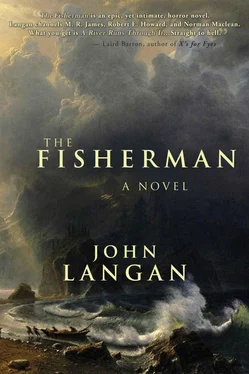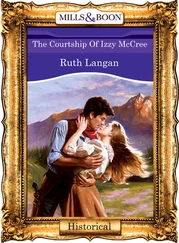The third picture was taken right around that time. In it, Marie’s leaning forward on the kitchen table, looking up and to her right, where I’m standing with the camera, telling her to smile, which she is, but there’s a year and half’s struggle behind that smile, a deep weariness eighteen months in the making. She’s wearing a kerchief around her head, dark blue with white flecks. She was never happy with the wigs they provided her. Her skin has pulled tight against the bones of her face, her arms; it’s as if she’s aged at an accelerated pace, as if I’m getting to see what she would have looked like had we seen our thirtieth anniversary. Behind her, the morning sun is spilling through the windows over the sink, outlining her in gold.
Two weeks after that photo, she was gone. In a matter of two days, the bottom fell out from beneath us; there was barely enough time to rush her to the hospital bed she died in. What followed: the endless phone calls to tell people she’d passed, the visit to the funeral home (which we’d both put off), the wake, the funeral, the reception at the house afterwards, all of it was like some strange play I’d been cast in, but for which no one had provided me the script. I guess I did all right; however you judge such things. And when everything was over, the door shut on the last guest’s departure, there was the liquor cabinet, freshly stocked by a number of the friends and family who’d come to see Marie off. That cabinet, with its rows of bottles, and more shoeboxes full of more pictures than I’d expected.
So there I was, in, I don’t mind saying, a bad place, my wife gone and me doing what I could to join her. It was, you might say, a cold February in my soul. And then one morning my eyes pop open and waiting for me is this thought, I need to go fishing . I wish I could make you understand how powerful it was. I lay there for a while, waiting for it to go away. I lay there for a good long while, and when it was still there, glaring in my mind like a big neon sign, I decided I would give in to it. What the hell, right? I found a shirt and pants that weren’t too dirty, fished my car keys out of the toilet (don’t ask), and set off in search of fishing gear.
As you may have guessed, I had no idea what I was doing. From my house out towards Frenchman’s Mountain, I drove into town, to Huguenot Hardware, because I had this notion that a hardware store would be the place to go for your fishing tackle. I’d like to blame it on the booze, but it was just ignorance. Fortunately for me, the sales clerk there was kind enough not to send me on a wild goose chase, and pointed me across Main Street to what was then Caldor’s. For less than twenty dollars (I can’t remember exactly how much I spent; I want to say twelve fifty, but I’m not sure that’s right — wasn’t a lot, anyway), I was able to set myself up with a rod, reel, line, tacklebox, and net. Hat, too. When I told her I was planning a day of fishing, the checkout girl insisted I run back to men’s clothing and fetch a hat. She didn’t specify what kind of hat, just said that after having grown up with a father who was a fisherman, and an older brother who was a fisherman, and knowing a bit about fishing herself, she could say with confidence that if there was one thing I didn’t want to be caught without, it was a hat. Her advice sounded good, so I hurried to the men’s department and grabbed a Yankees cap that I still wear.
The same checkout girl told me I needed to see the Town Clerk for a fishing license, and suggested a spot off to the side of Springvale Road where she and her family had fished the Svartkil River on occasion. I thanked her for her good advice, and hurried out to take it. Springvale’s a narrow road that runs parallel to 32, the main north-south route in and out of town. For the first part of its length, the road hugs the west shore of the Svartkil, which is only about fifty yards across there, and fringed with maples and birch that hang out over the water. The checkout girl’s spot was a steep bank across the road from a horse farm and across the river from the town golf course. What a sight I must have made, a couple of hours later, sitting by the side of the river in my dirty slacks, wrinkled white shirt, and baseball cap, holding my new fishing rod like it was a strange tool I hadn’t the faintest idea how to use. I suppose it was. I’d broken open the tacklebox and taken hold of the first lure I laid my eyes on, a red and black number with a double set of triple hooks whose barbed points seemed as likely to snag a fish as anything. Cast after cast, I sent out that same lure, with nothing to show for it. It wasn’t until I’d been fishing for a good two weeks — and catching the handful of bluegill I’d pulled wriggling up from the water through as much dumb luck as anything — that an old man with a long gray ponytail who’d been fishing beside me passed me a plastic cup full of fat, muddy worms as he was leaving and suggested I might find one of these of more use.
Yes, I’d gone back. Even though that first day had been fruitless, not even a ghost of a nibble, just five hours of sitting on the riverbank watching the slow current carry my line past me, as well as of tangling my line in the trees overhanging the river a half dozen times; even though all I had for my efforts was a slightly stiff neck, I went back the next day. And the day after that. And the third day. And so on. Each day, I pulled into the spot on Springvale Road a little earlier, left it a little later, until my entire day was taken up with fishing. When I was done, which was to say when the last trace of daylight had seeped out of the sky, I packed up my gear and drove not home but into town, where I stopped at Pete’s Corner Pub for a burger and fries and a beer. I quickly became enough of a regular at Pete’s that the waitresses knew both me and my order, and, instead of wasting time bringing me a menu, brought me my beer — Heineken, in a tall glass — and checked that I was having the usual, which they’d already called into the kitchen. After I started back at work, I discovered I could still squeeze in a couple hours of fishing at the end of the day if I were organized and brought my rod and reel with me in the car. As I say, it was around that time that I switched from my lure to worms, and all of a sudden, my line was singing. The Svartkil, I learned, was full of fish: besides the bluegill, there were pumpkinseed sunfish, smallmouth bass, bullhead catfish, even a monster walleye that snapped my line before I could bring him all the way on shore. Since I didn’t know anything about cleaning and cooking fish, I threw back everything I caught, but that didn’t matter.
I realize all of this must sound like some kind of inspirational story, “How Fishing Saved My Life,” or the like, and I don’t mean it to. For a long time after that first day at the river, especially once fishing season was over that fall, there were more than enough nights I rode to sleep on a wave of Scotch. The house stayed a mess, and my meals at Pete’s, which remained a daily habit, were the best I ate. Sitting on the couch or lying in bed thinking of Marie, I felt as bad as I ever had, maybe worse, because each day that passed was another reminder of how far away I was from her. Fishing was no miracle cure.
When I was at the river, though, if I didn’t feel any better, at least I didn’t feel any worse. Perched on the bank, I was visited by feelings that had been keeping their distance since Marie breathed her last — since she first found the lump in her breast, really. There was satisfaction, which came with a good cast, with watching the hook arc out overhead, listening to the reel unspooling, finding the spot where the line plunked through the water. There was joy, which came but rarely and never stayed long, at pulling back on the rod and watching the green length of a smallmouth break the river’s skin, twisting as it hit the air. Mostly, there was calm — I might even call it peace — which came from sitting watching the brown water slide by, on its way from a lake down in the mountains of western New Jersey up to its destination in the Hudson. Those hours on the Svartkil were breathing room, if you see what I mean, and it’s hard for me to say what would have been my fate if I hadn’t had them. Maybe I’d have been all right, anyway. But when I was fishing, I usually didn’t drink as much at night, since, after having stopped at Pete’s, it was already pretty late and I was already pretty tired by the time I pulled in the driveway. And although, as I said, the house stayed a mess, I found that if I kept it a little less so, I could locate things like my shoes more easily, which let me get to fishing all the more quickly. My nightly burger and beer were the highlight of my day, culinarily speaking, but after the second day of fishing I started stopping at different delis in town for a sandwich, bag of chips, and a soda. The sandwiches were things like baloney and American cheese on white with extra mayo, or salami and provolone with mustard and onion; the chips left a shiny layer of grease on my fingers; and the soda coated my teeth with sugar; but it was a meal, and it was more regular eating than I’d been used to.
Читать дальше












